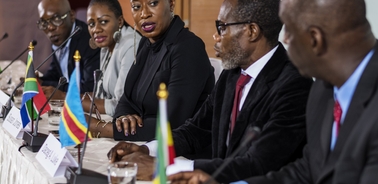- Home
- Blue Talks
- African Solutions To African Problems?
African solutions to African problems?

How African ownership of long-term solutions could shape the future of the continent, and the world
The phrase “African solutions to African problems” was coined by the Ghanaian economist George Ayittey in response to the crisis in Somalia in the early 1990s. His argument at the time was that “outside attempts to resolve African problems have regularly proven ineffective and even counterproductive” and that any “long-term solution to problems can come only from Africans themselves.”
Since then, however, the phrase has taken on a life of its own. It has been hotly debated in broader contexts, widely interpreted and continues to offer a framework through which to examine the continent’s problems and solutions. The notion has been picked up as a guiding principle of the African Union and has been used as a rallying cry by politicians across Africa.
“What the phrase means to me is that Africans should look within for solutions to their main problems because they know their context the best. No country in the world has ever been developed 100% with help from outside,” said Beatrice Grace Aluoch Obado, Associate Professor of international relations and sustainable development at IE University. “It’s not so much a question of excluding the rest of the world, but of Africans taking ownership of their destiny.”
“It’s not so much a question of excluding the rest of the world, but of Africans taking ownership of their destiny” -Beatrice Grace Aluoch Obado, Professor of international relations and sustainable development, IE University
For African countries to solve some of their most pressing problems, Aluoch Obado argues that the main challenge is educating and elevating leaders within the community. Leaders who can leverage Africa’s singular natural and human resources to improve the lives of the African people.
“Foreign intervention isn’t necessarily bad, but we need leaders that can negotiate deals that favor Africans. We need leaders who can govern and run institutions that can benefit from the global system,” added Aluoch Obado.
While Africa has seen significant progress, the legacy of western nations on the continent has not made it easy. Not only did colonialism destroy Africa’s traditional governance structures and leave Africans unprepared to take over, but colonial institutions were extractive by nature and never set up to benefit the African people.
Later, a lack of accountability surrounding aid and economic deals fueled corruption and mismanagement.
A moral responsibility
That begs the question of what the international community owes to Africa. Beyond the colonial legacy, many of Africa’s most pressing problems are global in origin.
For instance, it has been established that while Africa is responsible for just around 4% of global greenhouse gas emissions, no continent is more vulnerable to the impacts of climate change. Meanwhile, food security in many parts of Africa is being compromised by the war in Ukraine as food and fertilizer prices soar. This comes on top of COVID-19, which, besides the health impacts, pushed an estimated 55 million Africans into poverty in 2020.
There is a clear moral responsibility for developed nations to compensate African countries and boost their resilience to deal with global problems. But how can those reparations be made in a way that detaches from paternalism and presents Africans with the option of taking ownership of the solutions?
Borja Santos Porras, Executive Director of the IE School of Global and Public Affairs who has worked extensively in African development, suggests following the roadmap set out in the Paris Declaration on Aid Effectiveness. It provides a system to hold both donors and recipients accountable to commitments and is based on five principles: ownership, alignment, harmonization, results and mutual accountability.
For climate change, which he explores in-depth in this IE Insights article, he also suggests examining the concept of loss and damage as well as the need for a climate-related compensation fund.
“The secret to any project is finding a balance between policies that local institutions can properly administer and that are technically well designed and proven to positively impact society,” Santos Porras explained.
“The secret to any project is finding a balance between policies that local institutions can properly administer and that are technically well designed” - Borja Santos Porras, Executive Director of the IE School of Global and Public Affairs
The African century
Despite the many challenges facing Africa, some of which may seem intractable, both IE University professors are optimistic about the continent’s future.
At the moment, Africa makes up 15% of the world’s population but that share is expected to balloon to 40% by 2100, according to estimates by UNICEF.
“Africa will be able to reap its demographic dividend, which is when the share of the working-age population is larger than the dependent population,” said Santos Porras. “I’ve been to Ethiopia regularly and I’ve already seen incredible progress, especially in cities. I expect to see a great change in the decades to come.”
Aluoch Obado also pointed out that Africa is on the verge of getting 60% of its children into primary education — the educational threshold that Latin America and China reached before they “took off.”
She points to other improvements around infrastructure, economic growth and even a slight improvement in governance.
“I don’t see one Africa where everyone is benefiting because of population growth, progress won’t be uniform and some countries may struggle, but I can already see certain countries emerging as great beneficiaries,” she said.